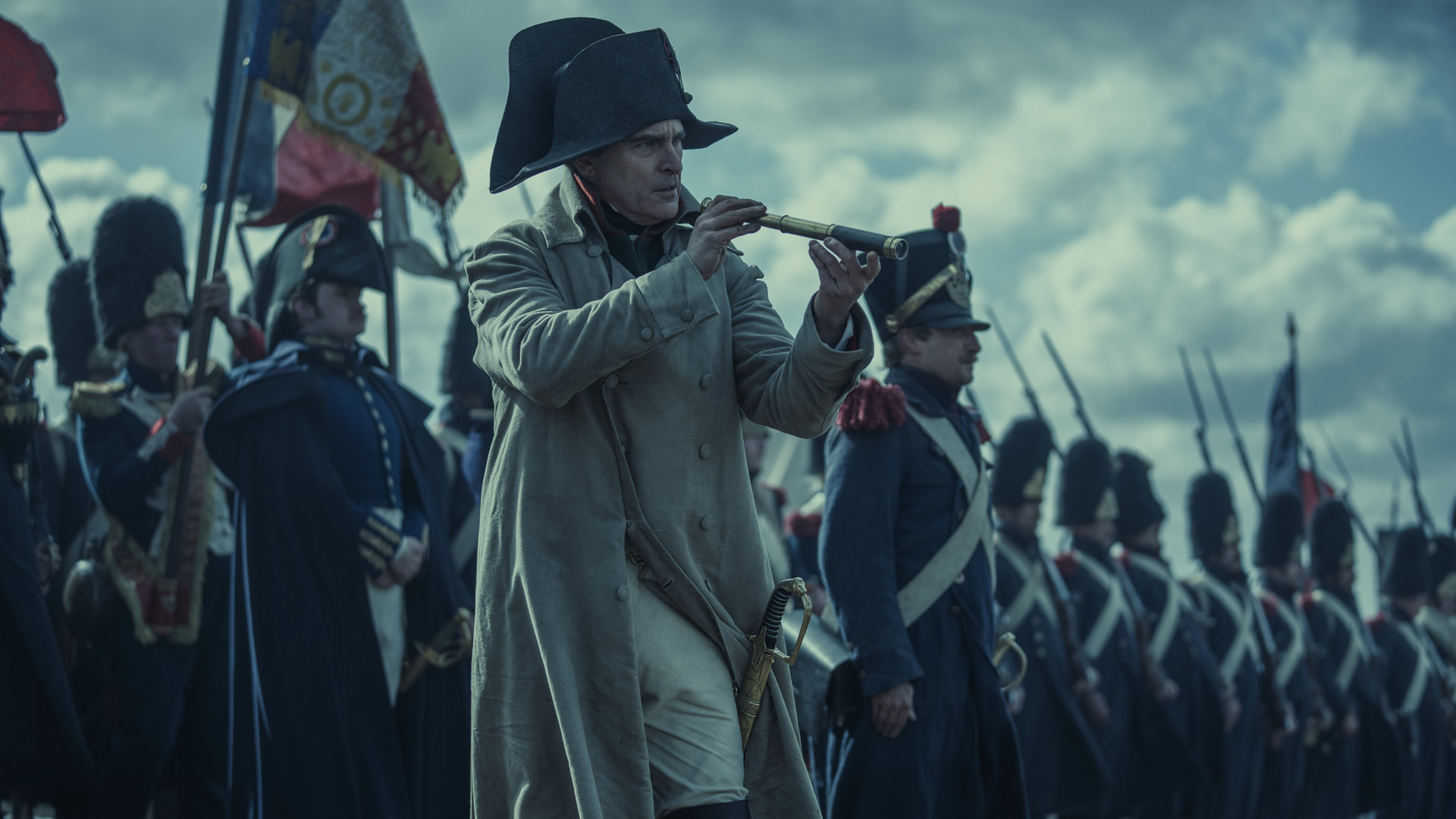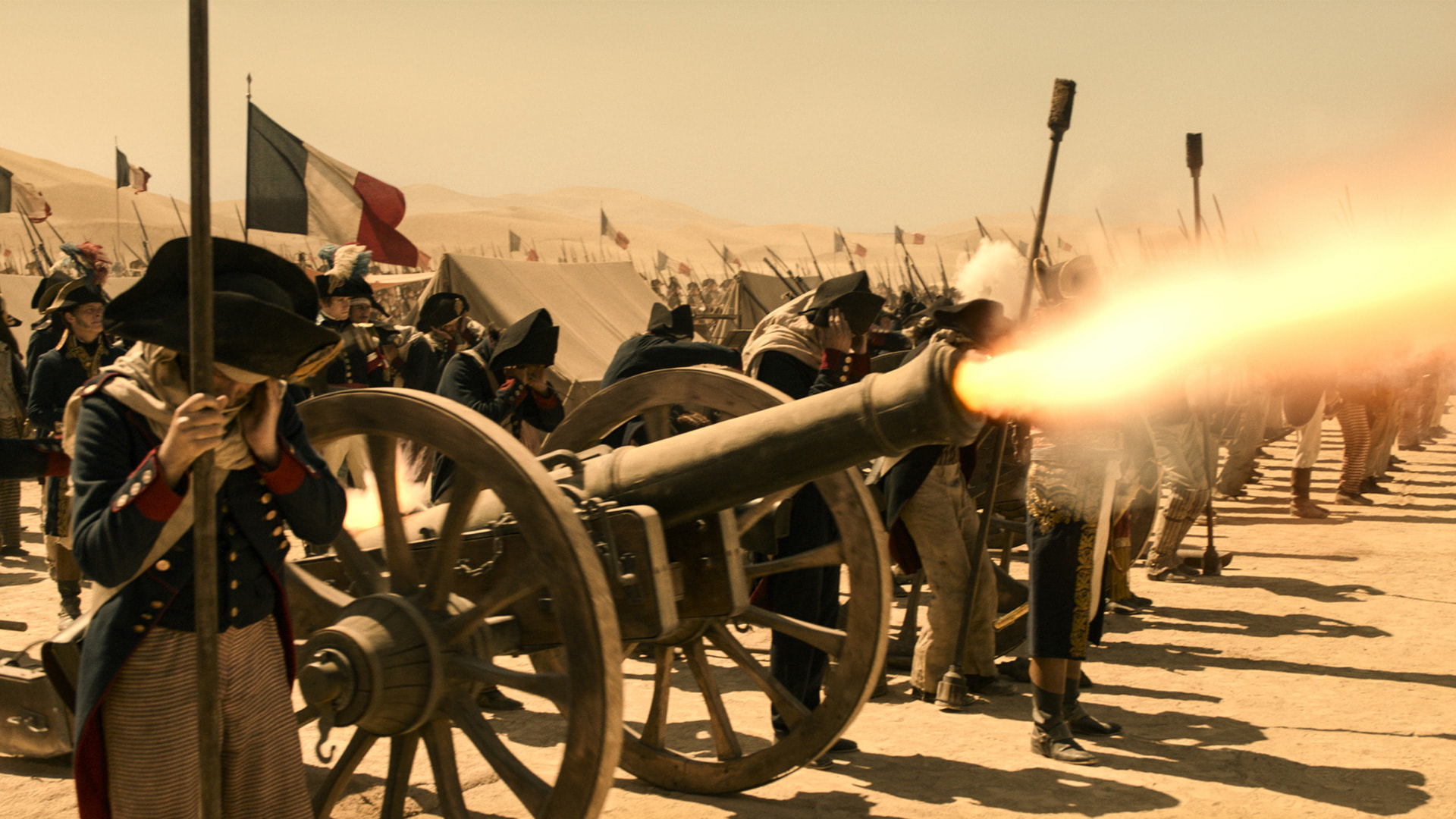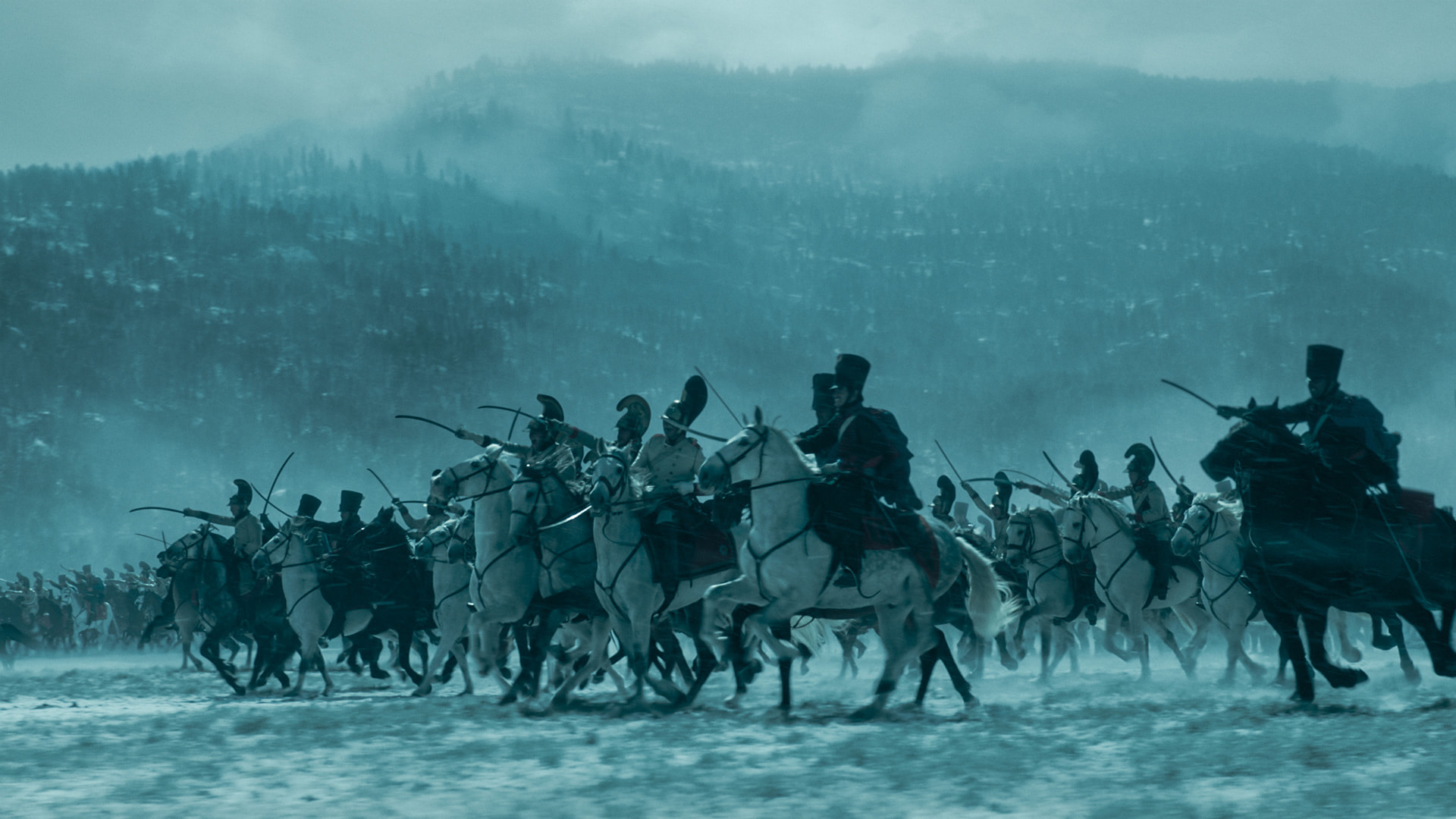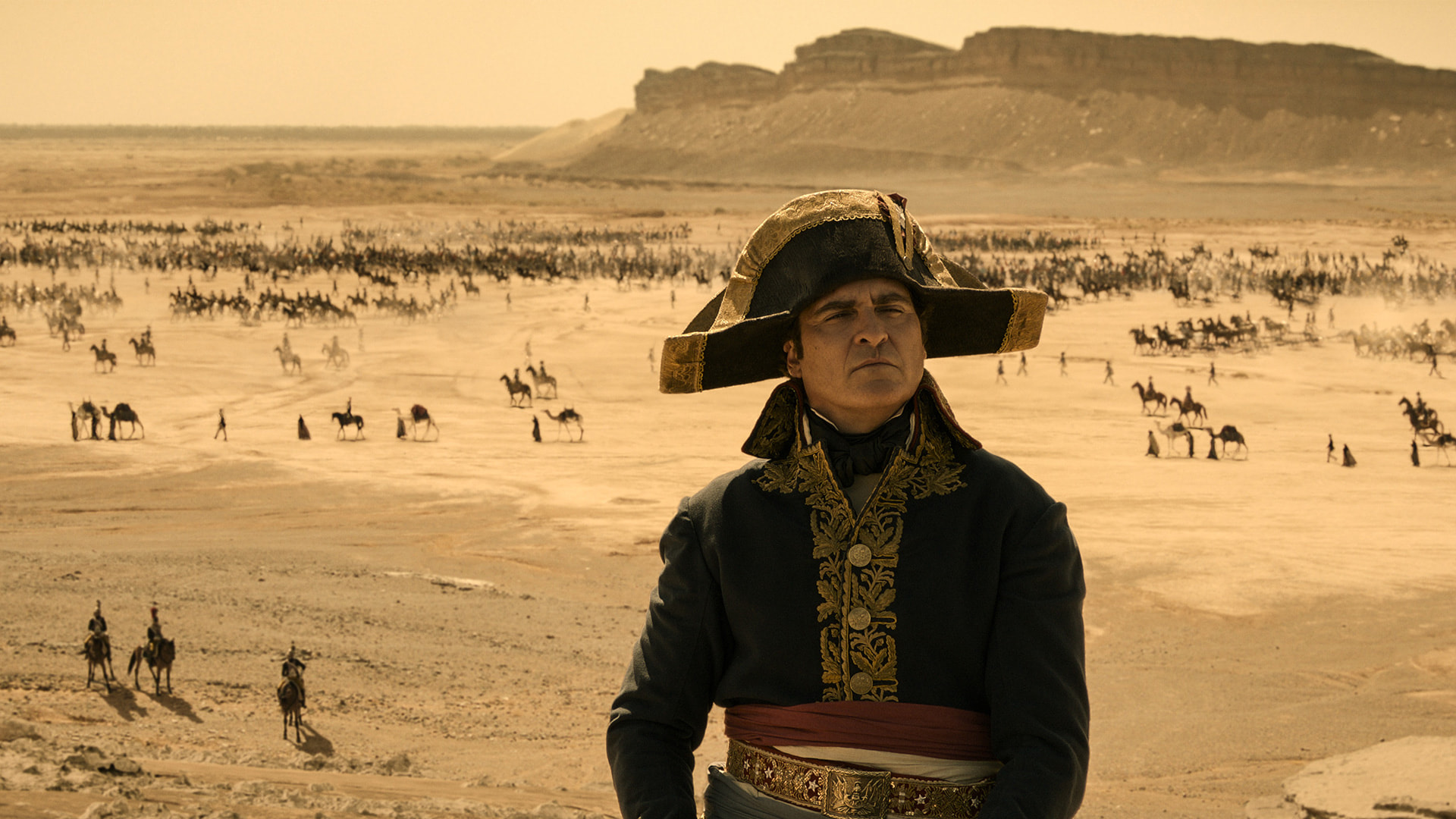History as Accident
Ridley Scott’s Napoleon

“Excuse me, mate, were you there? No? Well, shut the fuck up then.” With these words, the British filmmaker Ridley Scott not only dismissed historians criticizing his new period piece but attacked their profession as such.1 His Napoleon stands out in that it doesn’t even try to be historically accurate. Shortly after the trailer was released, a flurry of TikToks already pointed out where Scott had capitulated to fiction. The historian Simon Schama, speaking with The Financial Times, complained that the biopic failed to show Napoleon as an administrator and reformer, before blurting that he thought the script was “mostly shit.”2 Reviewing the film for Le Grand Continent, the editor of The Cambridge History of the Napoleonic Wars concluded that it “brought nothing new to Napoleon while showing a colossal disregard for history.”3 Most fancifully, Scott has the French artillery firing cannonballs into the pyramids of Giza.
Yet even if Scott ignores Leopold van Ranke’s famous slogan to tell history “wie es eigentlich gewesen,” Napoleon conveys a fairly consistent way of thinking about the past. To begin with, the Revolutionary and Napoleonic eras are stripped of all ideology. Scott is not interested in political history. Girondins, Montagnards, Thermidorians: the different groups of the Revolution are reduced to an undistinguished rabble of Frenchmen punching each other in assembly halls. The opening titles compress one of the most complex events of modern history into a platitude: “People are driven by misery to revolution... and brought back by revolution to misery.” Robespierre gets a word in on civic virtue, but the other officials appear to be motivated by nothing more than a blind will to power. In the breathless first hour of the film, Scott rushes from Napoleon’s siege of royalist Toulon to his coup of 18 Brumaire, leaving the viewer no time to figure out why any of these developments are happening in the first place. This is an anti-idealistic collage of the First Republic, one that dissolves its political divides and deflates its grand discourses (which to some degree explains the special hostility of French critics).
Joaquin Phoenix is just as unflattering as Napoleon. If Hegel is supposed to have described the emperor as “world history on horseback,” then this performance seems bent on disproving such a great man theory of history. We still get history from above – “the pathos of the humble” is not Scott’s thing, as Schama observed in an essay – only the leaders have been kicked off their pedestals.4 When Napoleon proclaims that his destiny is “more powerful” than his will, the film clearly sympathizes with his wife Joséphine de Beauharnais, who cracks up laughing, channeling a skeptical British pragmatism. This emperor is no world-historical genius but a provincial brute. Here is a rough and ready protagonist increasingly rare in contemporary Hollywood: a man whose character is built not on anxious inner turmoil, but on the sheer force of physical gestures. With a feeling for the nonchalant, Phoenix demonstrates a range of idiosyncrasies. He sighs, snorts, slaps his hat, spits out food, bumps into a mummy or coarsely wipes tears off Joséphine’s weeping face. The sloppier these flourishes, the more effective, as they introduce a measure of chaos into an otherwise streamlined and neoclassical mise-en-scène.

Monumental history being suspect, most contemporary directors would attempt a revisionist approach or present a more “human” portrait of the emperor, likely by delving into his psychology. Scott instead gives us something far weirder: Napoleon as freak. Critics have lamented that we never get a sense of the historical figure’s inner life – his military tactics, manipulative character, passion for fusing autocratic government with revolutionary ideals. The impression, however, is less that Napoleon remains a closed book in the film, than that there is not much to reveal in the first place. His imperial ambitions are depicted as stemming from childish jealousies and brash audacity, not grand thoughts. If Stanley Kubrick’s unrealized biopic of the French general would have included an entire scene discussing the Treaty of Tilsit, then this is how Scott’s Napoleon announces the disastrous Russian campaign: “I am sad today. Tsar Alexander has turned against me and forced me to invade Russia.” Once he arrives in Moscow, the pouting ruler slides into silliness, threatening to give Alexander “a little spanking.”
Sexually, Napoleon regresses from childishness to animalism, variously imitating a horse and a pig before copulating like a mechanical rabbit. Socially, the general emerges on the civilian scene as an anachronistic figure. His interactions are awkward, his seriousness outdated, his humor consistently off: the man never realizes that he is a joke. Watching the sophisticates yawning at Napoleon’s coronation, it dawns on us that the Empire style was already kitsch when it first emerged: a provincial and boyish vision of power, complete with Greco-Roman crown and Frankish scepter. Still, Napoleon bungles all refined conversation, talking over Joséphine when they first meet or stuttering that his second wife, the Austrian Marie Louise, is “beau-beautiful.” Scott’s own oeuvre, from Gladiator (2000) to Exodus: Gods and Kings (2014), has so accustomed us to the high eloquence of historical epics that such moments are nothing less than startling, as if we are watching a mumblecore film with a $200 million budget.
With its deliberate flattening of character, botching of eloquence, and sudden gore, the historical style of Napoleon perhaps most resembles the black comedy of Yorgos Lanthimos’s The Favourite (2018). At any moment, it is hard to decide what the exact tone of these films are. Scott’s late-career method is to mix different modes: the epic and the banal, the serious and the ridiculous, the lyrically beautiful and the brutally violent. In Napoleon, the past is strange not because of its odd customs, but because we – from the detachment of our contemporary vantage point – can see all these different modes at work, simultaneously. The result is often comical, but also harrowing: history as some kind of terrible joke.
To install this sense of the past, Scott tends to use music and background noise as affective counterpoints. The opening sequence (a beheading of Marie Antoinette set to the revolutionary tune “Ça ira”) merely antiquates Scorsese’s technique of juxtaposing popular music with extreme violence, but Scott more inventively twists genre codes in the scenes between Napoleon and Joséphine. Against a soft piano number shamelessly pulled from the Pride & Prejudice (2005) soundtrack, Joséphine at one point interrogates her suitor to find out if he minds that she does not exactly have an unblemished past. “No, madame,” Napoleon murmurs, at which she pulls up her dress and spreads her legs. The sentimental codes of romance and the vulgar pragmatism of a society woman widowed by the Terror: two realities that coexist in this mess of history, touchingly. Years later at Waterloo, a heroic trumpet sounds dissonant against elegiac violins, while a French marshal, surveying the corpse-littered battlefield, can only produce a bathetic sigh before charging to his death. Lacking ideological motivation or underlying causation, the many battles and regime changes of Napoleon all end up raising the same question, a critical but general one: why this massive waste?

There is no necessity in Napoleon: events happen for no obvious reason, they might as well not have occurred, or they may have turned out differently. The abrupt cuts and tonal shifts in the narrative (which covers nearly three decades) ultimately produce a sense that the course of history is not preordained but highly contingent. Napoleon’s initial achievement is that it manages to free itself from the teleological straitjacket of most biopics, leaving the viewer with the unsettling realization that other outcomes were possible. Some scenes invite counterfactuals: what if Napoleon had botched his coup, depicted here as a clumsy and barely successful takeover? What if a sniper had managed to kill the emperor before Waterloo even started? But Scott most compellingly introduces contingency by scattering all kinds of “funny accidents” through the epic of Napoleon’s rise and fall. At an outdoor meeting with Tsar Alexander, the sound of a random mosquito buzzes through the speakers until Napoleon slaps his face to kill it, while in a deserted palace, the camera lingers to capture bird droppings splattering the Russian throne.
Like Oppenheimer (2023), the year’s other big biopic, Napoleon tells two stories at once, and Scott’s taste for the accidental has different implications for each. For the romantic history between Napoleon and Joséphine, played out in dark interiors, it means the two are not fated to be together. Love is here the product of relentlessly insisting on a chance encounter, of hammering on the same absurdity until it becomes a necessity. In one sequence, the lovers force each other to repeat the phrase “I am nothing without you.” As a manifestation, this mantra aspires to make the speaker fragile instead of strong, to soften the beloved until they require the other’s love. There is a sadistic edge to this marriage, but it is a sadism coming from a place of mutual weakness. Without it, these maladjusted outsiders from Corsica and Martinique could never enter the halls of power.
While the role of chance makes Joséphine and Napoleon’s relationship strangely gripping, it has a different effect when applied to the emperor’s public career. A string of impressive military set pieces, all drenched in the same desaturated blues, form the keystone of this narrative arch. The son of a colonel, Scott knows how to move men around a battlefield, but he is less skilled in explaining why they must die there. Yet the viewer does not exactly confront a causal void either. Scott delights in assigning great significance to minor factors: Napoleon’s jealousy, Joséphine’s pneumonia, the rain at Waterloo, a lucky shot – these things shape historical outcomes. Emphasizing such particularities was typical of a certain kind of historiography under postmodernism, which mistrusted the orderly developments of linear, progressive history. Napoleon’s messy and playful aesthetic – its bricolage of registers, intertextual references, emphasis on historical style over historical content – is then the formal expression of that sensibility.
As a postmodern product released in 2023, the film itself is something of an anachronism. For over a decade, we’ve been witnessing a return of grand narratives in entertainment, political rhetoric, and writing. Whether cognitivist, leftist, or triumphantly nationalist, these accounts respond to calls to find, once again, some direction or ultimate causes in human history. If contemporary viewers seek representations of the past that can be coherently linked to an uncertain present, then Napoleon’s fragmented chaos doesn’t make the cut, and it is hardly surprising that its public reception has been largely negative. Executed with finesse, Scott’s “untimely” film may have offered an effective antidote to the contemporary revival of grand explanatory stories that are, at best, even more old-fashioned and, at worst, simplistic and teleological. Yet the director’s hand is too rough for that: coarsely placing one chance coincidence after another, Scott fails to distinguish even a minimal hierarchy of causes. Stressing the unpredictable can be lever of critique, but when exaggerated, it sinks into critical laziness.
By the end of Napoleon, the viewer surveys a totally flat historical landscape: if everything matters equally on this plateau, then nothing does. Exiled in Saint Helena, moments before his death, Bonaparte finds a fly drowned in his cup of wine while a plant falls over on the windswept terrace. The suggestion is that his life cycle is as insignificant as that of a bug. Startled by the nihilism of this claim, Scott crawls back in the closing titles, piously listing the death toll of the Napoleonic Wars. For these people, at least, the emperor’s battle orders were more consequential than the maneuvers of a fly. But slapping some gravitas on the end of the film doesn’t dispel Napoleon’s light mood, a mood of both cheerful and chilling resignation – the mood of somebody who faces the past and doesn’t see the inevitability of a tragedy, but a string of unforeseeable accidents.

- 1Jonathan Dean, “Ridley Scott: I Didn’t Need Historians to Make My Napoleon Epic,” The Sunday Times, 12 November 2023.
- 2Lilah Raptopoulos, Simon Schama, and Raphael Abraham, “Culture Chat: ‘Napoleon’ with Historian Simon Schama,” December 8, 2023, in Life and Art, from FT Weekend, podcast.
- 3Alexander Mikaberidze, “Napoléon de Ridley Scott : de Trafalgar à Waterloo — sans Austerlitz,” Le Grand Continent, 23 November 2023.
- 4Simon Schama, “Napoleon and the mythmakers,” Financial Times, 25 November 2023.
Images from Napoleon (Ridley Scott, 2023)

